Displaying items by tag: second hand boat
Second-Hand Boat Scenarios Covered by the EU’s Recreational Craft Directive & UK’s Recreational Craft Regulations
Following the successful cooperation on VAT and customs, the leading European, British, and international leisure marine associations continue to provide clarity on the new post-Brexit trade relationships.
The International Council of Marine Industry Associations (ICOMIA), European Boating Industry (EBI), European Boating Association (EBA), British Marine (BM) and the Royal Yachting Association (RYA) now issue a clarification on certification requirements for second-hand boats in trade between the EU and UK post-Brexit.
In dialogue with the EU and UK authorities, the key questions were raised, and clarification received. EBI has been liaising with the European Commission and BM has taken the lead with the Department for Business, Energy and Industrial Strategy (BEIS). The scenarios have been confirmed by BEIS and are understood to be correct based on guidance by the European Commission.
Below are the scenarios for second-hand boats that are covered by the EU’s Recreational Craft Directive and the UK’s Recreational Craft Regulations. In cases where recertification would be required, a Post-Construction Assessment (PCA) will have to be completed. This applies from the end of the transition period (TP) on 1 January 2021.
Second-hand boat scenarios covered by the EU’s Recreational Craft Directive & UK’s Recreational Craft Regulations


Further clarifications are being sought from BEIS and the European Commission related to trade with Northern Ireland.
Commenting, Philip Easthill, Secretary General of EBI, says: “We are delighted to continue the positive cooperation on another important issue for industry and boaters. We hope that despite the additional barriers for second-hand boats, the clarification on VAT and now certification will facilitate trade as much as possible. Together with our partners, we will continue to work on mitigating the impact of Brexit through our advocacy channels at EU level.”
Lesley Robinson, CEO of British Marine, adds: “I am pleased that this collaborative approach between marine industry associations and governments has proved effective in receiving timely responses for our members. Whilst the agreed guidance approved by both BEIS and the EU Commission offers boat builders, brokers and consumers the clarity and reassurance required to proceed with trade, they still face impacts in terms of both time and cost when selling and buying second-hand boats cross borders. On behalf of our members, British Marine will now look to work with UK government at the reduction or removal of these new burdens.”
Patrick Hemp, Technical Consultant of ICOMIA, added: “We are aware that the obligation to recertify CE-marked second-hand boats, which were in Great Britain at the end of the transition period and then subsequently imported into the European Union, will come as a surprise to many within our sector but we hope that the continued collaboration between the marine industry associations provides further clarity on the different requirements within the new trade relationship.”
Boats for Sale – Buying Into The Floating Dream
#buyingaboat –Thinking of buying a second-hand boat? W M Nixon outlines the options, relates some experiences, discusses the role of the broker, and looks at boats on the second-hand market.
"Fools build boats for wise men to buy". That's the way the cynics used to see it a very long time ago. In those distant days, every boat was a one-off, and when a would-be customer went to a designer or builder and commissioned a new yacht, it was said that he or she was "building" the boat even if they never put a hand near tool nor timber.
So inevitably it was a long and sometimes painful process, requiring many decisions and much patience, with almost inevitably more money involved than was first mentioned. And it didn't end once the dreamship was launched. For the first season or two, there'd be modifications to be made, and extra equipment acquired until finally – around season two or maybe even three - the dream would then at last be nearing fulfillment.
By that time, the owner would be mentally exhausted, and much lighter in the pocket than could have been imagined. And for some, the fact that the boat had been brought to perfection was an end in itself. The novelty had gone. The challenge, and the pleasure, had been in creating the perfect boat, rather than in using her for the messy business of sailing the sea. When that stage was reached, the wise man seeking value in a good boat would move in, and snap up a bargain which would probably then be happily sailed in this new ownership for very many years.
It wasn't always like that, of course. But it did happen enough times to make you think that the creation of a boat was one thing, and her active use something completely different, so different in fact that the two things should have been seen as totally separate, to be done by two clearly defined sets of people.
That's the way it was a long time ago. But even in today's completely changed boat-building industry, where builders aspire to manufacture boats using techniques honed in car production factories, there are surely some lessons to be learned from the past, and we can leap across the decades to draw analogies.
There are still many people for whom a new boat is the only way to go, people who wouldn't dream of buying a used boat. The times may be long gone when part of the charm of having a new boat built was strolling into the building shed and seeing your dream taking shape. But nevertheless in today's world, a very reasonable equivalent is meeting a yacht manufacturer's agent in agreeable surroundings, and discussing at length any special features – few and all as they usually are – that can be incorporated into your own "unique" boat.
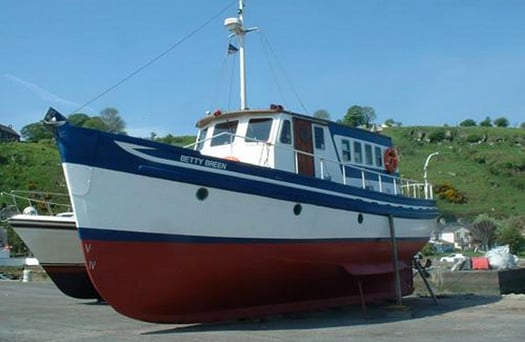
Something entirely different. But who wouldn't be interested? The 50ft former Waterford Pilot Boat Betty Breen, built by Tyrrell of Arklow in 1951, has been well converted to a seagoing cruiser, and she exudes heritage style while being well maintained. But ownership of a wooden vessel of this age and size is not for everyone, and the asking price of €45,000 reflects this.
Then too, buying new confers the maximum amount of warranty, and by creating a relationship with the agent, you can reassure yourself that, should any problems arise, then there is someone, some specific individual, to whom you have access for a quick and satisfactory solution.
But all these special privileges cost money, a lot of money, and the people who wouldn't think of buying other than in the second-hand market will be calculating that the depreciation is rapidly – indeed, almost immediately – out-stripping the benefits. They see themselves as the wise men, waiting to snap up a bargain as things start to turn sour for the starry-eyed new boat owners, who they see as people unhealthily obsessed with novelty.
It's different strokes for different folks. Some of us fit totally into the new boat category, while others completely avoid it, and some of us move between. It's partly a matter of taste. New boats are up-to-the-minute news, while used boats are at some stage along the heritage trail. If you have only ever tasted novelty, sometimes it's refreshing to move into a boat which is tried and tested, while those who feel that they've more than done their duty by used boats will find it an invigoratingly strange experience to acquire a new boat.
Either way, if you are seriously thinking about buying a boat, have you really thought about how you are going to use her, where you're going to keep her, and who is going to crew with you if you don't like being single-handed?
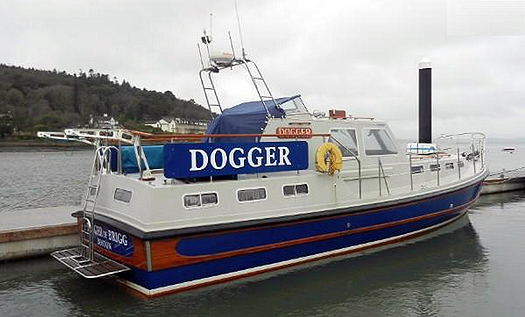
For some sailors, the Nelson range is the only way to go with powerboats for all-weather seafaring. This 1978 Nelson 42 is for sale through Crosshaven Boatyard at €99,000.
This may all seem blindingly obvious to anyone not bitten by the bug, but believe me it is often overlooked. People don't really buy boats at all – rather, they buy a dream, a dream of how they're going to sail the sea or the inland waterways, a dream of how they're going to escape from the rat-race to a healthy outdoor life. So very quickly, the simple fact of deciding and buying a boat becomes the fulfillment of the dream. But subsequent attempts to realize the dream in reality once the boat has been bought – sometimes with indecent haste – can end in disappointment.
Not being someone who changes boats frequently, I've only limited experience of why newcomers to boat-owning buy a boat, but I well remember from a long time ago one man whose family were concerned that he was over-working. As he had done some sailing, the suggestion was he should buy a boat and revive himself with a spot of cruising. We were selling our little cruiser-racer at the time, and in a classified advert we'd listed her main achievements, which included some cruising awards and the occasional race win.
He was after us like a terrier, though he did attempt to disguise his excitement, for he was a cool businessman after all. But what he really wanted was instant access to the cruising and sailing dream, and our little boat and her sailing record provided it straight off the shelf. So the deal was soon done, and the boat was sold away from our home port, which was a good thing to do, for we'd been very happy with that little boat, but it was time to move on.
There are a couple of twists to the tale. The following Christmas Eve, the phone rang. It was the new owner, more than somewhat irate. He'd been passing this morning of the festive season in sorting his new ship's papers, as one does, and he'd discovered that a bank had a charge on her. For all that he could tell from the papers, his new ship might be mortgaged up to the hilt. That completely floored me. Then I remembered that nine years earlier, when Howth Yacht Club was financing its new developments in the harbour, it did so by selling five-year marina berths. It was something of an act of faith, for it was all only on the drawing board at the time, but I so passionately believed in the need for the development that I reserved one of the berths. Yet at a time when the Irish economy had contracted by 2% in one year, the only way I could raise the money was by making our little boat a registered ship and getting a mortgage on her.
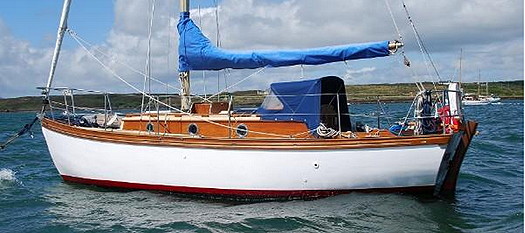
Who could resist her? This little classic 25-27ft sloop for sale through Crosshaven Boatyard is owned and lovingly maintained by a shipwright. Called Dainty, no claims are made as to her pedigree, but our research indicates she was built in Suffolk on England's east coast in 1939, though she wasn't commissioned until after World War II in 1945. Asking price for this boat of real character is €10,850
In those days banks were run by human beings, so a sympathetic bank manager friend set it up, arranged for repayments longterm from the current account, and told me the best thing to do was to forget that it was happening, as the pain would wear off over time. In our current national economic situation, perhaps we should remember that useful advice, and we should also remember that it was only recently that today's economic superpower of Germany finished paying off the reparations from World War 1, with relatively few even noticing the end of what had been in its day a very significant pain.
Whatever, there I was on Christmas Eve having to deal with a suggestion that I'd sold a boat fraudulently. In desperation I tried ringing the bank, and was surprised to get an answer. It seemed the Assistant Manager hated Christmas shopping, and had used the excuse of urgent business needing his attention to spend a quiet morning in the office. He was delighted to have something as unusual as a marine mortgage enquiry to deal with, and said he'd look into it and ring me back, for this was way before computers allowed instant answers. But the phone soon rang nevertheless, and he'd difficulty containing his mirth. "We've a real problem here" said he. Not what I wanted to hear, but I let him go on. "Yes indeed," said he, "that mortgage loan account is somehow in the black to the princely sum of £23. You should have been told. The charge has been long since cleared".
So it was Happy Christmas all round. Yet the other twists in the tale are mixed. Unfortunately, the new owner had bought the boat too late. He already had stress-related illnesses which led to his death shortly after he retired, and before he'd time to use the boat properly. And as for selling her away to put her safely out of mind, in due course a neighbour in Howth bought her, and for years now she has been berthed nearby and every time my wife sees the boat, she says it was such a pity we sold her, for we were so very happy with that little boat.
By this stage, if you're still with me, you'll have gathered that the purchase, ownership, use, and sale of a boat is a very complex business – there's an awful lot more to it than simply having a vehicle which floats and sails. So although there are many who happily wing it on their own – and their numbers are kept up by those who love surfing the internet in search of the dreamship – there's no doubt that in an age when specialisation is everything, using the services of a knowledgeable broker is very sound way to go.
As the economy slowly picks up, and people find that they're becoming cash rich and time poor, the broker's multi-functional role becomes ever more important. Unlike the private owner seeking a quick sale through the internet and taking no subsequent responsibility, the broker is in it for the long haul. He or she will benefit from building up a position of trust in the boating community, from having a good reputation as someone who will take a realistic view of what people really need in boats.
Because the buying of a boat is a business transaction, people will often lose sight of the fact that the underlying reason for it all is enjoyment and quiet pleasure. There is no economic reason for owning a boat, no pressing need, no essential requirement. I'm told it is possible to live without a boat. You buy a boat in order to enjoy it, whether it be through pride of ownership, delight in the sport of racing, simple pleasure in sailing, or simply having something which is variant on the sanctuary which is provided ashore by a good garden shed, something whose technical challenges can be happily absorbing provided they don't prove too much.
A good broker will have seen all this through many encounters with a wide variety of clients, and will also have an unrivalled knowledge of boats and their good and bad points. Good brokers can't help themselves – they like boats, they're fascinated by them. In fact, a good broker is often a yacht owner manqué, but if they're good at their job, so many boats will be going through their hands that they never get around to having one of their own, as they know that an even better one may come along soon.
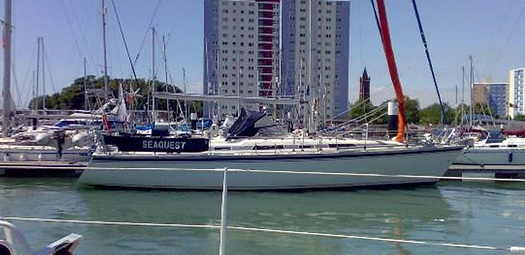
A powerful seagoing sailing cruiser, and she's in the sun already. This Westerly 48 is for sale through MGM Boats at £110,000.
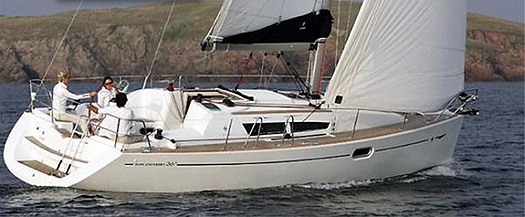
Just nicely run in. This 2007 Jeanneau Sun Odyssey 36i from MGM Boats is for sale in Dun Laoghaire at €89,900
We have four main brokers in Ireland who release details of their used boat range through the Afloat.ie website, and you'll find them all knowledgeable about their subject, and keen to talk about boats, in fact they'll chat on about any boat when the opportunity arises. And they're not deskbound by any means – try reaching one on his mobile, and you may well find he's crawling about in the bilges of some boat he's just been offered for his list, and is determindly investigating hidden aspects some starry-eyed potential owner would either not know about, or prefer to ignore.
Hugh Mockler is the man down in Crosshaven Boatyard covering the entire Cork scene and dealing nationally and internationally too, while Leinster Boats, based around Dun Laoghaire with links to Carlingford and New Ross, is Ronan Beirne. Martin and Gerry Salmon of MGM Boats with bases in Dun Laoghaire, Kinsale and Belfast may be thought of as at the top end of the market, but they and their staff are like all boat enthusiasts, keen to talk on the subject and you'll be pleasantly surprised by the range they can offer. And BJ Marine in Bangor, Malahide and Bangor are the senior firm on the east coast, operating nationally and internationally through Bernard Gallagher himself, and James Kirwan.
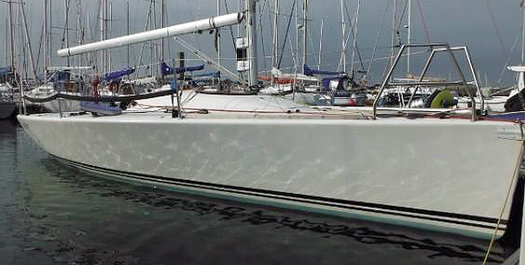
This 1997 Beneteau Platu 25 designed by Bruce Farr is a quality sports yacht easily handled and in race ready condition for Winter series is for sale through Leinster Boats at €15,000
Before buying or selling second-hand, it's a useful idea to acquaint yourself with the new boat situation, and the prices of new boats ready for sea. Fresh out of the package is one thing, ready for sea with added equipment can be something else altogether. And of you've been with one boat for a long time, or at least living with the idea of acquiring one particular type for some time, a realistic look at the new prices can be helpful for everyone, if sometimes a bit of a shock.
Mind how you go, though, for browsing the lists can become addictive, and if you're no more than a nautical tyre-kicker, the brokers will soon spread the word among themselves. But if you're deep-down serious about buying a boat – or indeed about selling the one you have – then talk to a broker, for they really do like talking about boats, and they provide a dose of realism if you're in danger of losing the run of yourself.





























































